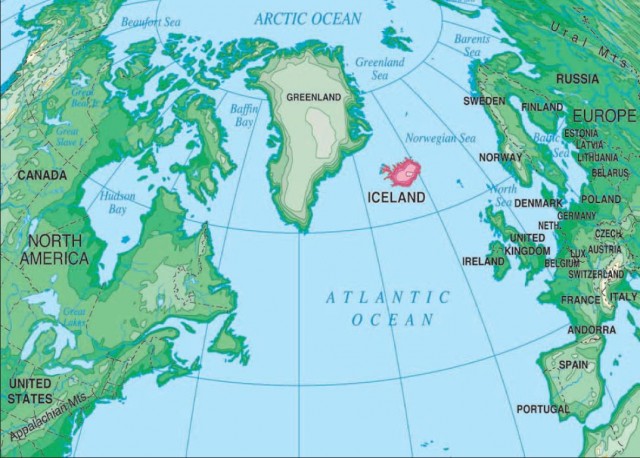Iceland: A Unique Land and People
By almost any measure, Iceland is one of the world's most unique lands. It is a remote, far northern island country that holds many mysteries and contradictions. Physically, it is a land whose features have been shaped and reshaped by the opposing agents of fire and ice. Its first inhabitants were Irish monks who sought seclusion on the island during the eighth century, a little more than 1,200 years ago, making Iceland one of the world's youngest countries in terms of earliest settlement. Even so, the country's parliament, the Althing (also Althingi, Alping, Alpingi), is believed to be the world's oldest government body still functioning. In another seeming contradiction, Iceland's people have achieved one of the world's highest standards of living, even though they have done so in an environment that offers many more challenges than it does useful resources. The small, 39,769-square-mile (103,000 square kilometers) island is precariously perched at the northern edge of the inhabited world, and no national capital is located farther north than Iceland's political center and largest city, Reykjavik.
Even the country's name is a contradiction: of the two large islands lying in the northern Atlantic Ocean between the shores of North America and northwestern Europe, nearly all of Greenland is buried beneath a huge mass of deep glacial ice, while Iceland is the one bathed by warm ocean currents that begin in tropical latitudes. This branch of the Gulf Stream keeps the island many degrees warmer than one would expect for its location hugging the Arctic Circle. In fact, nearly 90 percent of the island is ice-free and green much of the year. Iceland's early settlers found an island largely covered by lush meadows dotted with stands of birch, willow, and other hardy trees. Even so, no other country has more of its area, about 12 percent, covered by glacial ice (Greenland and Antarctica are not countries). And no country of comparable size has less of its area suited to farming.

Location is extremely important to a country's development, and, generally speaking, the more remote a country, the more isolated its people are from the diffusion (flow) of materials and ideas. Iceland is one of Earth's most isolated lands. Europe's northwestern shores lie to the east more than 500 miles (800 kilometers) across the open waters of the North Atlantic; 180 miles (290 kilometers) to the west lies ice-covered Greenland and its 60,000 residents; and the barren shores of Canada's Newfoundland lie more than 1,200 miles (1,930 kilometers) to the southwest.
However, Icelanders have defied the laws of isolation. In fact, they have developed a way of life that in many respects is one of the finest in the world. Isolation has been minimized in several ways and distance no longer limits communications. Destinations in North America and Europe are a short and relatively inexpensive hop away on the nation's international airline, Icelandair. Icelanders rank first in the world in per capita ownership and use of mobile phones and in use of the Internet. They can also boast of publishing, purchasing, and reading more books per person than any modern world nation. Economically, Iceland is a modern “welfare state” in which its 286,000 people receive many benefits funded by the government.
The cost of this is high; taxes take about half of all earned income. In return, however, Icelanders enjoy free health care, free education from preschool through university level, and a guaranteed retirement pension. Wealth is spread quite evenly through the population, and despite being Europe's most expensive country (and one of the most expensive in the world), Iceland has little poverty. Crime of any kind, particularly crime of a violent nature, is almost unknown. Among the world's countries, Iceland ranks fifth in per capita wealth and fifth in life expectancy, and is the fifth-least corrupt. The country's literacy rate of 99.9 percent is the world's highest, and no other country can match its high percentage of school-age children who actually attend school.With statistics such as these, it is little wonder that, according to the United Nations Human Development Report, Iceland is the fifth best country in the world in which to live!
Iceland boasts many firsts. In 1703, it conducted the first national census of the modern era. In 1980, it became the first modern world nation to freely elect a woman as head of state (She was so popular, in fact, that she was reelected to three additional four-year terms!). Iceland ranks first in the harnessing and use of geothermal energy. In fact, it is working to become the first country in the world to free itself from dependence on fossil fuels. Perhaps less praiseworthy, Iceland also ranks first in the per capita consumption of cola soft drinks!
Yes, in countless ways, Iceland is a fascinating, mysterious, contradictory land. It is a rugged land where dairy cattle must wear “bras” to protect their udders from the sharp volcanic rocks; it is a country where people swim outdoors during winter months in Arctic pools heated by geothermal springs; and, despite its small population, it is a country that boasts a Nobel Prize-winner in literature (Halldor Laxness, 1955) and one of the world's most famous pop singers (Bjork). This book will take you on a journey of this marvelous country. You will wander through its unique past and tour its present-day regions and cities. You will meet the Icelanders and learn of their way of life, government, and economy. You will visit sites that reveal why Iceland is so often referred to as a “land of fire and ice.”Welcome to Iceland—a unique land and people!